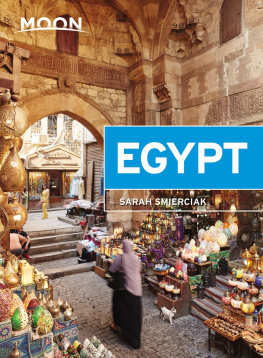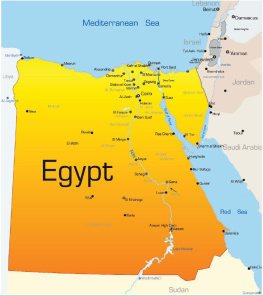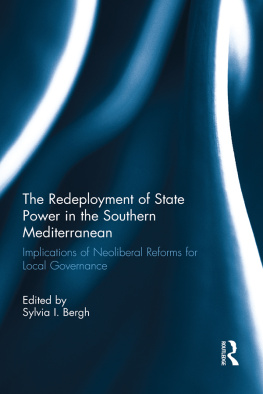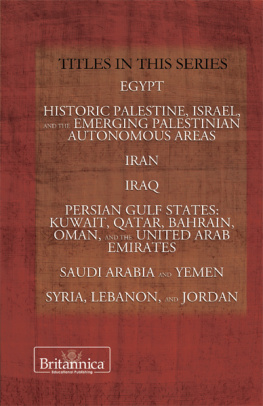This book is both uniquely broad and deep in its approach to understanding Egypts development failure which has occurred despite massive external support provided to the country. It presents a model by which similar developmental failures, whether in the MENA or elsewhere, can be analyzed and compared.
Robert Springborg, Naval Postgraduate School, USA
Sarahs work is an excellent contribution to the political economy of Egypt and the Middle East. It studies Egypts globalized trade and investment sectors. It reveals how foreign financial and developmental institutions were part of the networks of state-business relations, which has been hardly addressed before.
Amr Adly, American University in Cairo, Egypt
Interdisciplinary in methodology and theoretical orientation, Cronyism and Elite Capture in Egypt provides the most persuasive account of the networks, domestic and international, that shaped Egypts global market integration on neoliberal terms and reaped its benefits. Smierciak also reveals herself as a gifted narrator, and the result is an eminently readable story, absorbing and infuriating in equal parts, of crony capitalism in the late Mubarak era.
Roberto Roccu, Kings College London, UK
Cronyism and Elite Capture in Egypt
Examining businessstate networks in Egypt (19912020), this book highlights the complicity of international actors in facilitating inequality and elite capture. Using interdisciplinary methodology, it argues that Western actors promoting market liberalization have served as central partners in enabling elites to capture the fruits of Egypts economic reforms.
In the years leading up to the 2011 Revolution, Egypts crony capitalism reached new levels of visibility with the appointment of a Businessmen Cabinet. The businessmen-turned-state representatives ushered in a wave of market liberalizing reforms, expanding avenues for the abuse of power. Providing a detailed look at some of this periods chief beneficiaries, including a number of Egypts wealthiest oligarchs, the volume follows their ascent from former President Hosni Mubaraks first round of neoliberal reforms in 1991 through his last wave of reforms beginning in 2004 and ending in regime overthrow. The final chapter examines the fate of these elites under the brief rule of Muslim Brotherhood President, Mohammed Morsi, and of Abdel Fattah el Sisis current military-backed regime.
Based on five years of fieldwork and dozens of interviews with businessmen and state representatives, this book offers a unique look into the politics of policy, and inequality, in Egypt. It will be of interest to scholars reading political economy, international development, and Middle East studies.
Sarah Smierciak is currently based in Cairo where she writes freelance political economy analysis. She taught undergraduate courses on history and politics in the Middle East and North Africa at Oxford University. In 2016, she was awarded a Fulbright Grant to conduct research in Istanbul with Syrian and Iraqi communities. Sarah co-edited the Routledge Handbook on Contemporary Egypt (2021) and wrote Moon Egypt, a travel guide for the Moon series (2022).
Routledge Studies In Middle Eastern Politics
The Iraqi Kurds and the Cold War
Regional Politics, 1958-1975
Hawraman Ali
Islam, Jews and the Temple Mount
The Rock of Our/Their Existence
Yitzhak Reiter and Dvir Dimant
Saudi Interventions in Yemen
A Historical Comparison of Ontological Insecurity
Caroline F. Tynan
Middle Eastern Monarchies
Ingroup Identity and Foreign Policy Making
Anna Sunik
Nationalism and Islamism in the Kurdistan Region of Iraq
The Emergence of the Kurdistan Islamic Union
Mohammad Salih Mustafa
Indigenous Land Rights in Israel
A Comparative Study of the Bedouin
Morad Elsana
Turkeys Electoral Geography
Trends, Behaviours and Identities
Edited by Edip Asaf Bekarolu and Glsen Kaya Osmanbaolu
Lebanese Political Parties
Dream of a Republic
Christian Thuselt
Cronyism and Elite Capture in Egypt
From Businessmen Cabinet to Military Inc.Sarah Smierciak
For a full list of titles in the series:
https://www.routledge.com/middleeaststudies/series/SE0823
Cronyism and Elite Capture in Egypt
From Businessmen Cabinet to Military Inc.
Sarah Smierciak
First published 2022
by Routledge
2 Park Square, Milton Park, Abingdon, Oxon OX14 4RN
and by Routledge
605 Third Avenue, New York, NY 10158
Routledge is an imprint of the Taylor & Francis Group, an informa business
2022 Sarah Smierciak
The right of Sarah Smierciak to be identified as author of this work has been asserted by her in accordance with sections 77 and 78 of the Copyright, Designs and Patents Act 1988.
All rights reserved. No part of this book may be reprinted or reproduced or utilised in any form or by any electronic, mechanical, or other means, now known or hereafter invented, including photocopying and recording, or in any information storage or retrieval system, without permission in writing from the publishers.
Trademark notice: Product or corporate names may be trademarks or registered trademarks, and are used only for identification and explanation without intent to infringe.
British Library Cataloguing-in-Publication Data
A catalogue record for this book is available from the British Library
Library of Congress Cataloging-in-Publication Data
A catalog record has been requested for this book
ISBN: 978-1-032-02811-8 (hbk)
ISBN: 978-1-032-02815-6 (pbk)
ISBN: 978-1-003-18534-5 (ebk)
DOI: 10.4324/9781003185345
Typeset in Times New Roman
by SPi Technologies India Pvt Ltd (Straive)
To Egypts reform losersthat you someday enjoy the wealth of your country.
Acronyms
ALICOAmerican Life Insurance CompanyAmChamAmerican Chamber of CommerceATCAgreement on Textiles and ClothingAUCAmerican University in CairoBdCBanque du CaireBusinessMedUnion of Mediterranean Confederations of EnterprisesCBECentral Bank of EgyptCEEBAConfederation of Egyptian and European Business AssociationsCIBCommercial International BankCIGCentury Investment GroupCIICCommercial International Investment CompanyEAFEgyptian Armed ForcesEBDAEgyptian Business Development AssociationEBRDEuropean Bank for Reconstruction and DevelopmentECESEgyptian Center for Economic StudiesEDFExport Development FundEEA/ExpoLinkEgyptian Exporters AssociationEEPCEgyptian Export Promotion CenterEFGEgyptian Financial GroupEGPCEgyptian General Petroleum CorporationEIBEuropean Investment BankEMFNEgyptian Microfinance NetworkENCCEgyptian National Competitiveness CouncilEQIEnvironmental Quality InternationalERCEgyptian Refining CompanyERFEconomic Research ForumERSAPEconomic Reform and Structural Adjustment ProgramEUEuropean UnionEUSBCEgypt-US Business CouncilFDIForeign Direct InvestmentFECFood Export CouncilFECCFederation of Egyptian Chambers of CommerceFEIFederation of Egyptian IndustriesFGFFuture Generation FoundationFTAFree Trade AgreementGAFIGeneral Authority for Investment and Free ZoneGAFTAGreater Arab Free Trade AreaGAOAGeneral Authority for Organization and AdministrationGDPGross Domestic ProductGISGeneral Intelligence ServiceGNPGross National ProductGOEGovernment of EgyptGOIEFGeneral Organization for International Exhibitions and FairsIDAIndustrial Development AuthorityIFCInternational Finance CorporationIFIInternational Financial InstitutionIMCIndustrial Modernization CenterIMFInternational Monetary FundIPOInitial Public OfferingITCIndustrial Training CouncilMedAllianceMediterranean AllianceMENAMiddle East and North AfricaMMIDMansour-Maghraby Investment & Development CompanyNDPNational Democratic PartyNGONon-governmental organizationOECDOrganization for Economic Cooperation and DevelopmentPPPPublic Private PartnershipQIZQualifying Industrial ZoneRMGReady-Made GarmentsRMGECReady-Made Garments Export CouncilSCAFSupreme Council of the Armed ForcesSCZoneSuez Canal ZoneSFDSocial Fund for DevelopmentSMESmall and Medium-sized EnterpriseTECTextile Export CouncilTMGTalaat Moustafa GroupUNDPUnited Nations Development ProgrammeUNIDOUnited Nations Industrial Development OrganizationUSAIDUS Agency for International DevelopmentUSTRUS Trade RepresentativeWBWorld BankWTOWorld Trade Organization










